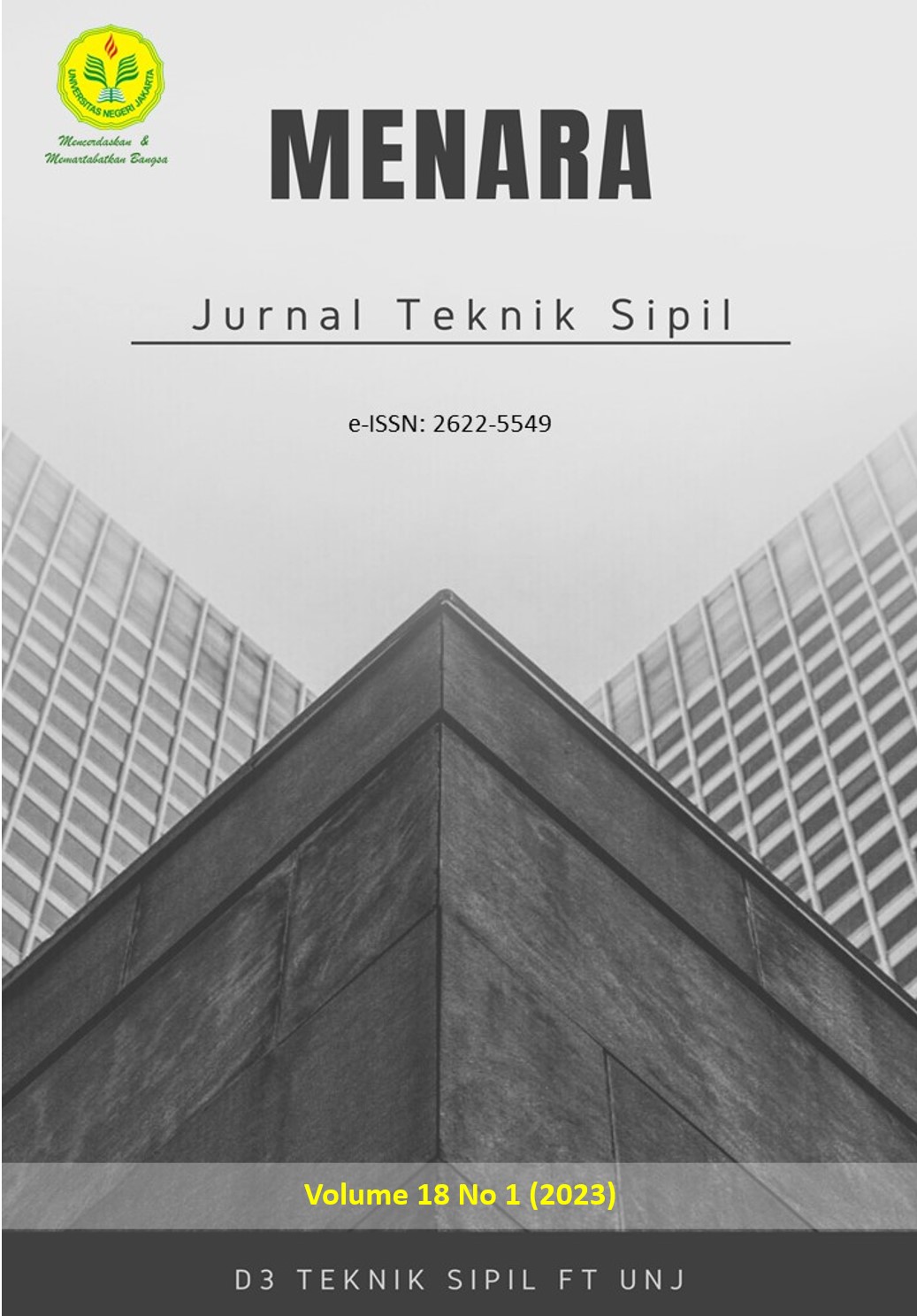ANALISIS DEVIASI KEMAJUAN PEKERJAAN BERDASARKAN PERSENTASE DURASI WAKTU PADA PEKERJAAN KONSTRUKSI BANGUNAN
DOI:
https://doi.org/10.21009/jmenara.v18i1.29213Keywords:
construction work, deviation of progress, expected value, uncertainty, yield valueAbstract
No construction work has the same progress—various factors as the cause of inequality. A positive progress deviation indicates good construction work. Otherwise, it is said to be bad if it has a negative value. The uncertain nature of the construction work causes 3 (three) possible scenarios of the value of the deviation of progress so that the three values form one value of the deviation of the expected progress. Deviations of value greater than 10% for a duration from 0 to 70% are categorized as binding contracts. This study aims to determine the deviation of the progress of 25 construction works. The research method was quantitative. Data collection was carried out on 25 construction works that had been carried out. Data was taken from contractors directly. The results of the data analysis show that when 25%D is obtained, 10 poor-performing construction jobs, Next for 30%D construction work. 50%D and 70%D underperformed 9, respectively; 9; and 8. The largest positive progress deviation value is 15,362 at S70%D. The expected value of the largest progress deviation is positive 1.763. By knowing the value of negative progress expectations, contractors should control delays before the contract is completed.
References
Asmi, A., & Pratama, J. C. S. (2016). Identifikasi Faktor-Faktor Keterlambatan Dalam Proyek Konstruksi Di Jakarta. Jurnal.Umj.Ac.Id/Index.Php/Semnastek, November, 1–12.
Bhosekar, S. K., & Vyas, G. (2012). Cost Controlling Using Earned Value Analysis in Construction Industries. International Journal of Engineering and Innovative Technology, 1(4), 324–332. https://www.researchgate.net/profile/Gayatri_Vyas2/publication/265285339_Cost_Controlling_Using_Earned_Value_Analysis_in_Construction_Industries/links/553b16c50cf2c415bb08ffcf/Cost-Controlling-Using-Earned-Value-Analysis-in-Construction-Industries.pdf
Gerawork Jembere, M., Bewket Mitikie, B., & Kelemework Yigzaw, E. (2020). Performance Evaluation of Housing Construction Project, Using Earned Value Analysis; the Case of 20/80
Condominium Addis Ababa Bole Arabsa Site. American Journal of Engineering and Technology Management, 5(4), 69. https://doi.org/10.11648/j.ajetm.20200504.12
Hassan, H., Mangare, J. B., & Pratasis, P. A. K. (2016). Faktor-faktor penyebab keterlambatan pada proyek konstruksi dan alternatif penyelesaiannya (studi kasus : di manado town square III). Jurnal Sipil Statik Vol.4, 4(11), 657–664.
Huda, K., Mulyadi, L., & Santosa, A. (2018). Analysis of time and cost performance with earned value method in lecture building project development of nutrition department at East Kalimantan health polytechnic. International Journal of Scientific and Technology Research, 7(2), 203–207.
Mardiaman. (2020). Determining Weight Criteria/ Sub-Criteria In Selecting Public Construction Work Contractor. Palarch’s Journal Of Archaeology Of Egypt/Egyptology, 17(9), 9485–9495. https://archives.palarch.nl/index.php/jae/article/view/5910/5786
Mardiaman. (2022). Perencanaan dan Penjadwalan Konstruksi (1st ed.). KBM Indonesia.
Mardiaman, & Indriasari. (2021). Faktor-Faktor Penentu Utama Keterlambatan Pada Pekerjaan Konstruksi Pabrik ( Studi Kasus : Pabrik Kawasan Cikarang ). E-Journal CENTECH 2020, 2(1), 1–11. http://ejournal.uki.ac.id/index.php/cen
Mardiaman, & Kusuma, E. (2021). Study of Progress Expected Results Based on Percentage of Construction Work Plan Duration. Jurnal Teknik Sipil Universitas Islam Lamongan, 6(2), 167. https://doi.org/10.30736/cvl.v6i2.628
Milah, S., Nurmayadi, D., & Hendardi, A. R. (2019). Analisis Pengendalian Waktu Proyek Konstruksi Menggunakan Earned Value Concept (EVC) Dan Critical Path Method (CPM). Jurnal Ilmiah Teknik Sipil, 1(1), 1–14.
Peraturan Menteri Pekerjaan Umum Dan Perumahan Rakyat Republik Indonesia Nomor 07/PRT/M/2019 Tentang Standar Dan Pedoman Pengadaan Jasa Konstruksi Melalui Penyedia, Berita Negara Republik Indonesia Tahun 2019 Nomor 319. Jakarta (2020).
Shahsavand, P., Marefat, A., & Parchamijalal, M. (2018). Causes of delays in construction industry and comparative delay analysis techniques with SCL protocol. Engineering, Construction and Architectural Management, 25(4), 497–533. https://doi.org/10.1108/ECAM-10-2016-0220
Suharto, D. (2007). Earned Value Method Untuk Pendendalian ( Studi Kasus Proyek Pembangunan Gedung Balaikota Surak). Jurnal Teknik Sipil UNS Surakarta.
Downloads
Published
Issue
Section
License
Authors who publish with this Journal agree to the following terms:
- Author retain copyright and grant the journal right of first publication with the work simultaneously licensed under a creative commons attribution licensethat allow others to share the work within an acknowledgement of the work’s authorship and initial publication of this journal.
- Authors are able to enter into separate, additional contractual arrangementfor the non-exclusive distribution of the journal’s published version of the work (e.g. acknowledgement of its initial publication in this journal).
- Authors are permitted and encouraged to post their work online(e.g. in institutional repositories or on their websites) prior to and during the submission process, as it can lead to productive exchanges, as well as earlier and greater citation of published works.











